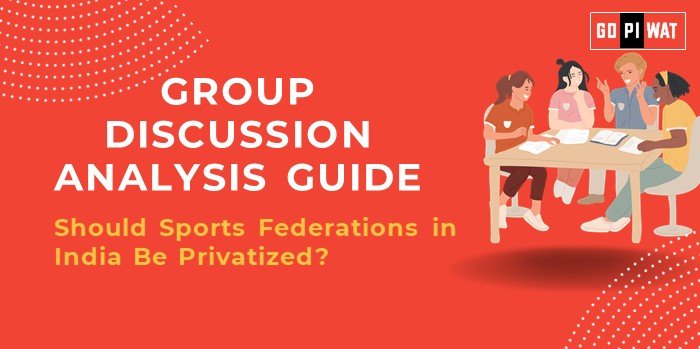📋 Group Discussion Analysis Guide
🏅 Should Sports Federations in India Be Privatized?
🌟 Introduction to the Topic
- 📜 Opening Context: The debate over privatization of sports federations in India stems from a desire to improve performance, infrastructure, and transparency in the sports sector. With a growing focus on achieving global sporting success, this issue is increasingly relevant.
- 📖 Topic Background: Historically, Indian sports federations have been managed under government oversight, often criticized for inefficiencies and bureaucratic hurdles. Privatization promises better resource allocation and professional management, as seen in global examples like the NBA and EPL.
📊 Quick Facts and Key Statistics
- 💰 Sports Budget Allocation (FY 2023-24): ₹3,397 crore – highlights the scale of public investment in sports.
- 🥇 Medal Tally (2023 Asian Games): India’s best-ever tally of 107 medals – underscores potential for better outcomes with improved management.
- 🏏 Privatized Leagues: IPL (cricket) valued at $10.9 billion (2022), showcasing success under privatized frameworks.
- 🌍 Global Examples: USA spends over $10 billion annually on sports infrastructure, largely privatized.
🤝 Stakeholders and Their Roles
- 🏛️ Government: Policy creation and funding for grassroots sports.
- 💼 Private Companies: Investment in sports infrastructure, leagues, and training.
- 🏃 Athletes: Beneficiaries of better systems but vulnerable to commercial exploitation.
- 👥 Citizens: Consumers of sports, whose expectations shape market dynamics.
🎯 Achievements and Challenges
✨ Achievements
- 📈 Success of privatized leagues like IPL and ISL in boosting viewership and revenues.
- 🤝 Improved athlete training through private academies (e.g., JSW Sports).
- 🌍 Rise in sponsorship and global recognition for Indian sports.
⚠️ Challenges
- ⚖️ Risk of profit-over-ethics scenarios affecting grassroots initiatives.
- 🏗️ Lack of private interest in non-commercial sports like athletics and wrestling.
- 📜 Governance issues, exemplified by controversies in existing federations.
Global Comparisons:
- 🇺🇸 USA: NCAA ensures sports at all levels are well-funded and managed.
- 🇬🇧 UK: Football Association operates with significant private investment and public accountability.
🗣️ Structured Arguments for Discussion
- 📈 Supporting Stance: “Privatization ensures professional management and funding, enabling India to excel in global sports like cricket.”
- ⚖️ Opposing Stance: “Privatization may neglect grassroots sports, where government intervention is crucial.”
- 💡 Balanced Perspective: “Privatization, paired with regulatory oversight, can enhance sports federations without compromising inclusivity.”
💬 Effective Discussion Approaches
- 📌 Opening Approaches:
- “India’s rise in cricket due to IPL is proof of what privatization can achieve for other sports.”
- “Sports like wrestling and hockey, despite rich traditions, need privatization to regain glory.”
- 🔄 Counter-Argument Handling:
- Highlight ethical practices under privatized models globally (e.g., NCAA scholarships).
- Emphasize hybrid models where government ensures equitable sports access.
📈 Strategic Analysis of Strengths and Weaknesses
Strengths:
- 💼 Professional management.
- 📈 Increased funding.
- 🌍 Better athlete exposure.
Weaknesses:
- 📉 Neglect of unprofitable sports.
- ⚖️ Commercial exploitation risks.
Opportunities:
- 🌟 Growth in global sporting events.
- 📱 Investments in sports technology.
Threats:
- 📜 Monopoly concerns.
- 🇮🇳 Dilution of national pride in sports.
🏫 Connecting with B-School Applications
- 📚 Real-World Applications: Privatization insights apply to leadership, policy management, and corporate social responsibility.
- 🎓 Sample Interview Questions:
- “What role does privatization play in improving sports governance?”
- “How can India balance privatization with grassroots sports development?”
- 💡 Insights for B-School Students:
- Opportunity to explore privatization models in capstone projects.
- Strategic lessons from sports marketing and league management.


